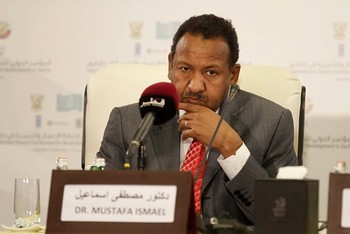Sudanese officials predict economic improvement this year
February 5, 2014 (KHARTOUM) – The governor of Sudan’s central bank Abdel-Rahman Hassan Abdel-Rahman forecasted that the economy will witness significant shifts in the coming period after moving to diversify away from dependency on oil exports.

The Sudanese official told a visiting Bahraini delegation that boosting non-oil exports will help preserve the country’s Forex reserves.
Sudan has seen its economy take a nosedive after the south became independent in July 2011, taking with it three-quarters of the once united country’s oil output. According to figures from the International Monetary Fund (IMF), the country’s GDP contracted by 4.4% in 2012.
After the country’s partition, the Sudanese government was forced to undertake austerity measures including one last September that triggered violent demonstrations across the country.
The Sudanese currency’s value has eroded relative to the US dollar in the black market trading at lows 8.2 pounds last month compared to the official rate of 5.7.
In related statements, the investment minister Mustafa Osman Ismail declared that the government will “unify” the US dollar exchange rate through the tripartite program that is working to reduce imports and increase exports.
“We will see a definite end to the black market in US dollar,” Ismail said. He acknowledged that fluctuation in the US dollar exchange rate against the Sudanese pound adversely impacted efforts to attract and retain investments.
This however, did not prevent Sudan from continuing to attract foreign investors despite obstacles encountered, he said.
Last November, Ismail acknowledged that inflows of Foreign Direct Investments (FDI) in the country have declined since the secession of the oil-rich south in mid-2011 compared to the prior decade.
Sudan has been struggling to narrow the gap between the official and black market rates of foreign currency exchange which has been widening since the country’s breakup.
Some foreign businesses particularly in telecom saw the instability in currency eating into their profits.
(ST)
